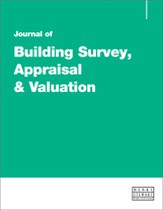Repair, replacement and obsolescence: The dilapidations dilemma
Abstract
Lease covenants to repair draw on a long history of case law precedent for interpretation and understanding. The decision to repair or replace is determined on a case-by-case basis according to the standard of repair. The complexity is compounded when spare parts are no longer available, forcing replacement with something different, or when changes are required to comply with legislation. Care must be taken to define the standard of repair needed, as well as identifying areas where tenant works may be superseded.
The full article is available to subscribers to the journal.
Author's Biography
Paul French is Managing Director of Set Square Surveyors and is a Chartered Building Surveyor with around 30 years in professional practice. He is a member of the RICS’ panel of experts specialising in dilapidations and accredited to offer the RICS’ Dispute Resolution Service (DRS) as a form of alternative dispute resolution for dilapidations claims. Paul was Chairman of the Federation of Corporate Real Estate (2016–18) and is currently Vice-Chair.
Citation
French, Paul (2019, March 1). Repair, replacement and obsolescence: The dilapidations dilemma. In the Journal of Building Survey, Appraisal & Valuation, Volume 7, Issue 4. https://doi.org/10.69554/FJOV8283.Publications LLP
